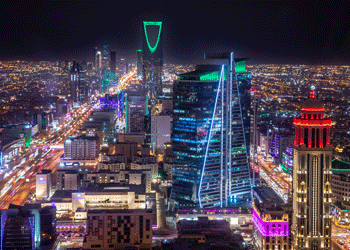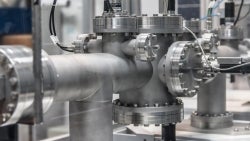Riyadh confirms capital expenditure cuts
7 May 2025

Saudi Arabia has reported a 19% drop in government capital expenditure (capex) during the first quarter of this year compared to the same period last year. Capex spending in Q1 2025 was SR27.8bn ($7.4bn), down from SR34.5bn in Q1 2024.
The Ministry of Finance reported the drop in expenditure in its Quarterly Budget Performance Report for Q1 2025.
The government’s reduction in capex occurred at the same time as a drop in contract awards. According to regional projects tracker MEED Projects, there was a significant reduction in contract awards during Q1 2025.
There were $16.9bn of contract awards in the kingdom during Q1 2025, which includes private and public sector clients – including the Public Investment Fund (PIF) and its subsidiary development companies, as well as public-private partnership (PPP) projects.
The number of contract awards has also declined. According to MEED Projects, there were 108 contract awards during Q1 2025, which is down from 191 during Q1 2024 and 186 in Q4 2024.
Big deals
The largest project deal during Q1 2025 was the $2.2bn PPP deal awarded by Saudi Water Partnership Company (SWPC) to develop and operate the kingdom’s second independent water transmission pipeline (IWTP). The project involves building a 587-kilometre pipeline that can transmit 650,000 cubic metres a day of water between Jubail in the Eastern Province and Buraydah in the Qassim region. A developer team comprising local companies Aljomaih Energy & Water, Nesma Company and Buhur for Investment Company was selected for the project.
Only two other contract awards were valued at over $1bn. Saudi Aramco awarded Larsen & Toubro Energy Hydrocarbon, a subsidiary of India’s Larsen & Toubro Group, a $1.5bn contract to build a large-scale carbon capture and storage hub in Jubail Industrial City.
Gigaproject developer Diriyah Company awarded the other $1bn-plus deal. It awarded a joint venture of local firm El-Seif Engineering & Contracting, Beijing-headquartered China State Construction Engineering Corporation and Qatari firm Midmac Contracting a $1.3bn contract to build the Royal Diriyah Opera House.
The total value of contract awards in Q1 2025 was down by almost half compared to the $33.5bn of contract awards made during Q1 2024. On a quarterly basis, the drop is more than 60% compared to the $42.7bn of contract awards made during Q4 2024.
Budget deficit
For the broader economy, Saudi Arabia ran a deficit of SR58.7bn during Q1 2025, which was fully financed through borrowing, as there were no withdrawals from government reserves.
Public debt increased in both domestic and external components. Domestic debt closed at SR797bn, and external debt closed at SR531.7bn, indicating active debt management strategies to finance the deficit.
Most recently, the National Debt Management Centre announced the closure of its April 2025 issuance under the government’s Saudi riyal-denominated sukuk programme, with a total allocation amounting to SR3.710bn.
The sukuk issuance was structured into four distinct tranches to cater to varying investor needs. The first tranche, valued at SR1.315bn, is set to mature in 2029. The second tranche, amounting to SR80m, will mature in 2032. The third tranche, with a size of SR765m, is scheduled for maturity in 2036, while the fourth tranche, the largest at SR1.55bn, will mature in 2039.
In Q1 2025, total revenues reached SR263.6bn, with oil revenues accounting for SR149.8bn. This signifies a notable 18% decrease in oil revenues compared to the same period in 2024.
Also, oil income in the first quarter of this year accounted for 56% of total government revenues, down from 62% in the same period last year.
The slide in oil revenues is mainly due to lower crude oil prices, with the first quarter average for global benchmark Brent declining by 15% to around $75 a barrel compared to the same period in 2024.
Oil production
Oil production cuts by the Opec+ alliance also led to a fall in oil revenues for Saudi Arabia. The kingdom’s crude output declined by 1% in the first quarter to 8.95 million barrels a day (b/d), according to Opec data.
Saudi Arabia and Russia-led Opec+, however, began unwinding 2.2 million b/d of oil production cuts from April, with the coalition recently announcing a further output hike of 411,000 b/d in June. This move could result in an increased oil market share for Saudi Arabia, bringing in more oil revenues for the kingdom in the second quarter.
Non-oil revenues increased by 2%, reaching SR113.8bn, indicating some success in diversification efforts. Taxes on goods and services and other revenues contributed to this rise.
Total expenditures stood at SR322.3bn, which was a 5% increase on Q1 2024. Although capex decreased, other areas of spending increased.
Social spending
Notably, social benefits saw a significant 28% increase, reflecting the government’s commitment to social welfare programmes. Compensation of employees and use of goods and services also experienced increases.
For sectors, health and social development saw a 19% increase in actual expenditure compared to Q1 2024. This indicates a strong focus on these areas. Public administration also experienced a notable 14% increase.
Sectors such as municipal services and economic resources recorded slight decreases in spending.
The Finance Ministry report also provides insights into the government’s reserves and current account balances, with closing balances of SR393bn and SR91bn, respectively.
MEED’s April 2025 report on Saudi Arabia includes:
> GOVERNMENT: Riyadh takes the diplomatic initiative
> ECONOMY: Saudi Arabia’s non-oil economy forges onward
> BANKING: Saudi banks work to keep pace with credit expansion
> UPSTREAM: Saudi oil and gas spending to surpass 2024 level
> DOWNSTREAM: Aramco’s recalibrated chemical goals reflect realism
> POWER: Saudi power sector enters busiest year
> WATER: Saudi water contracts set another annual record
> CONSTRUCTION: Reprioritisation underpins Saudi construction
> TRANSPORT: Riyadh pushes ahead with infrastructure development
> DATABANK: Saudi Arabia’s growth trend heads up
Exclusive from Meed
-
 Saudi Arabia appoints new investment minister
Saudi Arabia appoints new investment minister13 February 2026
-
 Indian firm wins major Oman substation contract
Indian firm wins major Oman substation contract12 February 2026
-
 Dewa raises Empower stake in $1.41bn deal
Dewa raises Empower stake in $1.41bn deal12 February 2026
-
 Saudi cabinet approves Qatar high-speed rail link
Saudi cabinet approves Qatar high-speed rail link12 February 2026
-
 Bidders line up for Saudi sewage treatment contract
Bidders line up for Saudi sewage treatment contract12 February 2026
All of this is only 1% of what MEED.com has to offer
Subscribe now and unlock all the 153,671 articles on MEED.com
- All the latest news, data, and market intelligence across MENA at your fingerprints
- First-hand updates and inside information on projects, clients and competitors that matter to you
- 20 years' archive of information, data, and news for you to access at your convenience
- Strategize to succeed and minimise risks with timely analysis of current and future market trends

Related Articles
-
 Saudi Arabia appoints new investment minister
Saudi Arabia appoints new investment minister13 February 2026
Register for MEED’s 14-day trial access
King Salman Bin Abdulaziz Al-Saud has made a series of senior government changes, including Khalid Al-Falih leaving his role as investment minister to become minister of state and a member of the cabinet.
Al-Falih has been replaced by Fahad Al-Saif as investment minister. Al-Saif has been head of the Investment Strategy and Economic Insights Division at the Public Investment Fund (PIF) since 2024. That role involved formulating PIF’s long-term investment strategy. He has also served as head of the Global Capital Finance Division, a role he has held since joining PIF in 2021.
The change of investment minister comes at a time when securing investments has become a key priority for Saudi Arabia as it prepares to hand over more projects to the private sector for delivery.
King Salman also named Abdullah Al-Maghlouth as vice-minister of media and Abdulmohsen Al-Mazyad as vice-minister of tourism. Khalid Al-Yousef was named attorney general, and Sheikh Ali Al-Ahaideb will serve as president of the Board of Grievances.
Faihan Al-Sahli was selected as director general of the General Directorate of Investigation, while Abdulaziz Al-Arifi was chosen to lead the National Development Fund. Haytham Al-Ohali will head the Communications, Space and Technology Commission, and Fawaz Al-Sahli will chair the Transport General Authority.
https://image.digitalinsightresearch.in/uploads/NewsArticle/15645415/main.gif -
 Indian firm wins major Oman substation contract
Indian firm wins major Oman substation contract12 February 2026

India’s Larsen & Toubro has won a contract to build the Majan 400/220/132kV grid station in Oman.
Estimated to cost $100m, the project includes an associated 400kV line-in line-out underground cable from Sohar Free Zone to the Sohar Interconnector Station.
The contract was awarded by Oman Electricity Transmission Company (OETC), part of the government-owned Nama Group.
The grid station will comprise eight 400kV gas-insulated switchgear (GIS) bays, eight 220kV GIS bays and 10 132kV GIS bays at the new Sohar Free Zone substation.
The scope includes the installation of two 500MVA, 400/220kV transformers and two 500MVA, 220/132kV transformers.
Local firm Monenco Consulting Engineers was appointed in April last year to provide design and supervision services for the project.
As MEED exclusively revealed, the main contract was tendered in June, as part of three significant contracts to build new substations in the sultanate.
The second contract, worth about $35m, covers the construction of the Sultan Haitham City 132/33kV grid station and associated 132kV line-in line-out underground cables running 4 kilometres from Mabella to Mabella Industrial Zone.
The third contract, valued at about $100m, covers the construction of the Surab 400/33kV grid station and an associated 400kV line-in line-out cable from the Duqm grid station to the Mahout grid station.
Local firms Muscat Engineering Consulting and Hamed Engineering Services are consultants for the Sultan Haitham City and Surab projects, respectively.
The two remaining contracts are currently under bid evaluation, with awards expected this quarter.
https://image.digitalinsightresearch.in/uploads/NewsArticle/15638107/main.jpg -
 Dewa raises Empower stake in $1.41bn deal
Dewa raises Empower stake in $1.41bn deal12 February 2026
Dubai Electricity & Water Authority (Dewa) has announced it has increased its stake in Emirates Central Cooling Systems Corporation (Empower) from 56% to 80%.
The transaction was completed through the purchase of 2.4 billion shares and the transfer of the entire ownership of Emirates Power Investment (EPI), which is wholly owned by Dubai Holding.
The total value of the deal is AED5.184bn ($1.41bn).
Empower currently holds over 80% of Dubai’s district cooling market and operates 88 district cooling plants across the emirate.
According to MEED Projects, the UAE’s district cooling sector currently has nine projects worth $1.29bn in the pre-execution phase.
Empower has ownership in four of these projects, which have a combined value of $472m.
This includes a $200 million district cooling plant at Dubai Science Park, with a total capacity of 47,000 refrigeration tonnes serving 80 buildings.
Empower signed a contract to design the plant last August, with construction scheduled to begin by the end of the first quarter of 2026.
The utility is also building a district cooling plant at Dubai Internet City.
UAE-based TMF Euro Foundations was recently appointed as the enabling and piling subcontractor for the project.
https://image.digitalinsightresearch.in/uploads/NewsArticle/15635949/main.jpg -
 Saudi cabinet approves Qatar high-speed rail link
Saudi cabinet approves Qatar high-speed rail link12 February 2026
Saudi Arabia has approved the establishment of a proposed high-speed rail line connecting Riyadh and Doha.
The approval was granted during a cabinet session chaired by King Salman Bin Abdulaziz Al-Saud in Riyadh on 10 February.
The high-speed railway line will cover 785 kilometres (km) and will pass through Hofuf and Dammam, while also linking King Salman International airport and Hamad International airport.
Saudi Arabia and Qatar signed an agreement in December last year to build a high-speed rail line.
The agreement was inked by Saudi Arabia’s Transport & Logistics Services Minister, Saleh Al-Jasser, and Qatar’s Transport Minister, Sheikh Mohammed Bin Abdulla Bin Mohammed Al-Thani.
Trains will reach speeds exceeding 300 kilometres an hour, reducing the travel time between the two capitals to about two hours.
The project is slated for completion in six years. It is expected to serve over 10 million passengers annually and create more than 30,000 direct and indirect jobs.
Riyadh and Doha relaunched the proposed rail link between the two countries in 2022, after agreeing to set a date to begin studying the connection.
In July of that year, France’s Systra was selected to conduct a feasibility study on the proposed scheme, as MEED reported.
A rail link connecting Saudi Arabia and Qatar was planned before the diplomatic dispute that froze relations between Riyadh and Doha from 2017 until the Al-Ula Declaration was signed in January 2021.
In 2016, Qatar Railways Company (Qatar Rail) planned to tender a design-and-build contract for the construction of regional railways in Qatar, including a link to the Saudi border.
https://image.digitalinsightresearch.in/uploads/NewsArticle/15635582/main.jpg -
 Bidders line up for Saudi sewage treatment contract
Bidders line up for Saudi sewage treatment contract12 February 2026

Six bidders are competing in the next phase of Saudi Arabia’s long-term operations and maintenance (LTOM) sewage treatment programme, as National Water Company (NWC) moves closer to awarding a contract.
The contract covers the North Western A Cluster Sewage Treatment Plants Package 11 (LTOM11) and has an estimated value of about $211m.
The project involves the construction and upgrade of two sewage treatment plants with a combined capacity of about 440,000 cubic metres a day (cm/d).
As MEED understands, the companies that have submitted proposals include:
- Alkhorayef Water & Power Technologies (Saudi Arabia)
- Civil Works Company (Saudi Arabia)
- United Water (China)
- Kuzu Group (Turkey)
- VA Tech Wabag (India)
- Aguas de Valencia (Spain)
LTOM11, also known as the North Western A Cluster, forms part of the second phase of NWC’s rehabilitation of sewage treatment plants programme.
The scheme is being procured on an engineering, procurement and construction (EPC) basis with a long-term operations component.
The scope also includes a pumping station, surplus discharge lines, SCADA installation and associated infrastructure.
The main contract was tendered last year, with an award initially expected by the end of 2025.
It is now understood that NWC is preparing to offer the main contract in this quarter.
LTOM programme
LTOM11 follows a series of earlier awards under the programme.
In January, a consortium of United Water (China), Prosus Energy (UAE) and Armada Holding (Saudi Arabia) won the main contract for the Northern Cluster Sewage Treatment Plants Package 10 (LTOM10).
This has an estimated value of about SR203m ($54.1m).
NWC previously awarded $2.7bn-worth of contracts for the first phase of its LTOM programme. This comprises nine packages covering the treatment of 4.6 million cm/d of sewage water for the next 15 years.
As MEED reported, local contracting firm Alkhorayef Water & Power Technologies won three contracts with a combined capacity of 2.04 million cm/d, nearly half of the awarded total. These three contracts are worth more than SR5.53bn ($1.47bn).
A consortium of France’s Suez and the local Al-Awael Modern Contracting Group, with its affiliate Civil Works Company (CWC), won two packages worth a combined SR1.84bn.
A consortium comprising France’s Veolia and Awael-CWC won a single package worth SR1.26bn, and local utility developer Miahona won one package worth SR392m.
In 2024, a joint venture of CWC and Al-Awael Modern Contracting was awarded a $211m contract for LTOM9.
As part of the second phase, the main contract bids for LTOM12 (North Western B Cluster) have also been submitted.
https://image.digitalinsightresearch.in/uploads/NewsArticle/15635292/main.jpg



.gif)